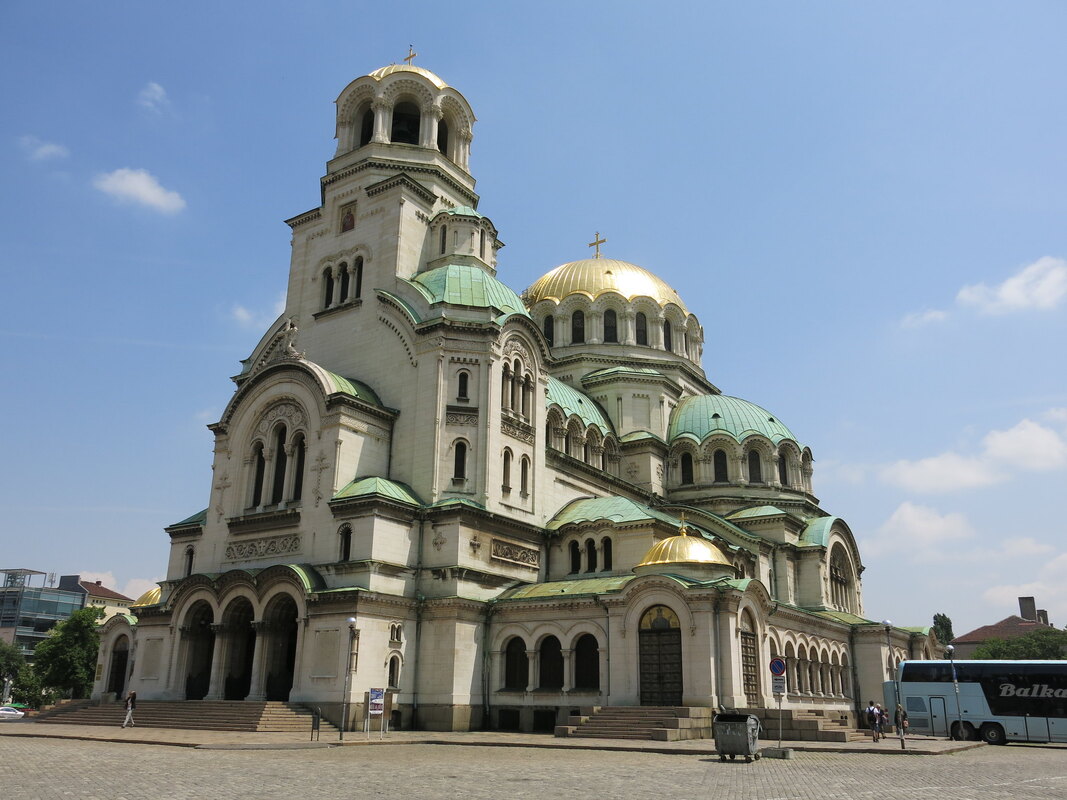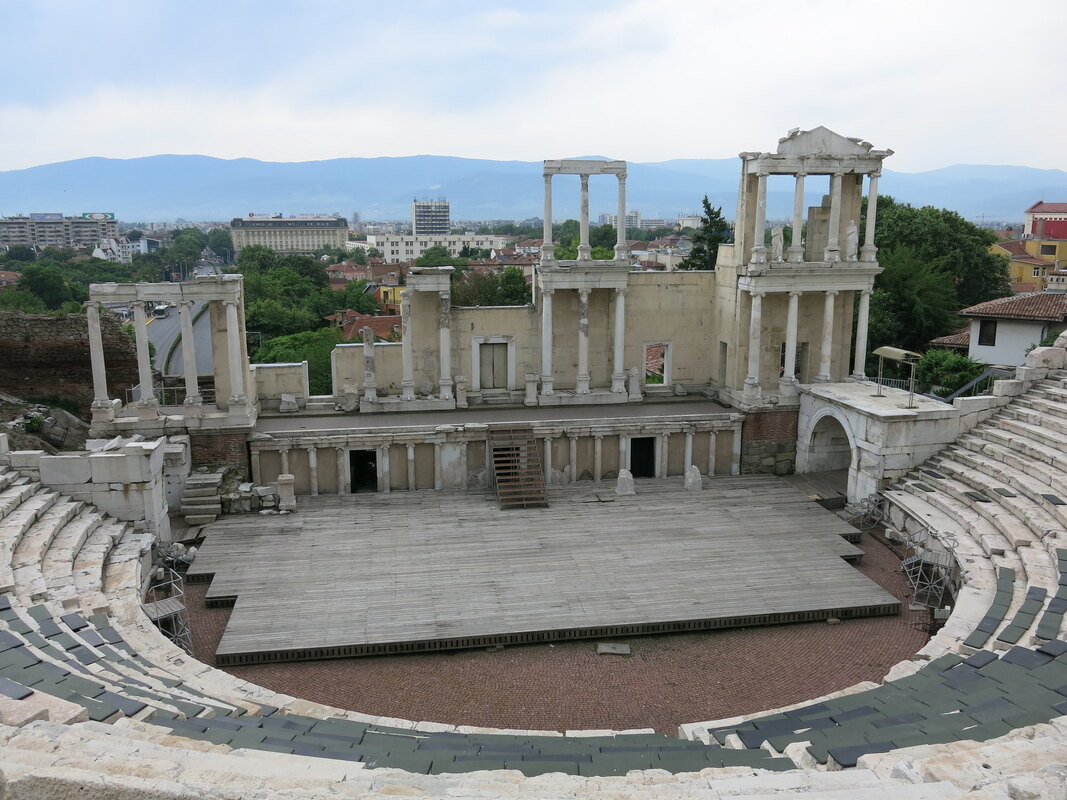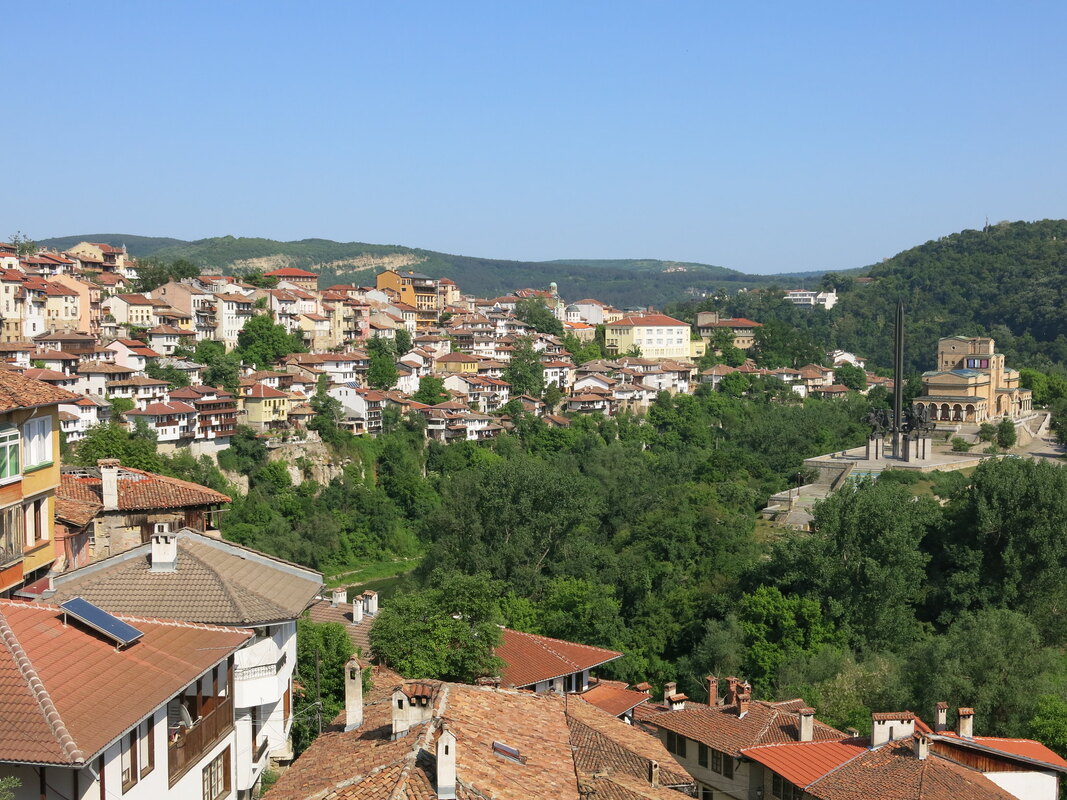BULGARIA
Bulgaria feels like France-Light. It's France on a smaller scale. In Sofia, the results are spectacular. Narrow tree lined streets lead to an endless array of parks and squares. Wide shopping boulevards provide a place to sit and watch locals congregate after work. Everywhere there are cafes and park benches to drink a cappuccino or beer depending upon the time of day. The France-Light feel does not seem to work as well at Bulgaria's secondary destinations. Vileko Tărnovo with the Tsarevets castle complex and Plovdiv with its Roman theaters are both underwhelming. In Sofia leisure and local life are immediately intertwined while in Vileko Tărnovo and Plovdiv more of an effort must be made.
That Bulgaria feels France-Light seems to contradict its history and geographical position. 500 years of Ottoman occupation shows little in the culture, cuisine, and architecture. The stately government administrative buildings reflect styles from the days of Russian monarchies and imperialism. Russian assistance in 1878 allowed Bulgaria to attain independence and later this allegiance resulted in the country's participation in the Soviets state run communism.
In the years since the fall of the Soviet Union the country seems to have successful transitioned to the European pleasure paradise model. In the evening it can be difficult to find an open table at one of the cafes along Vistosha Boulevard. Later hip restaurants and lounges cater to a sophisticated yet noticeably casual crowd. Bulgaria may be "new", it may be "undiscovered", but it also feels wonderfully familiar. I'd move here tomorrow. Work remotely? Forget the rural America, I'm moving to Sofia. Faster internet too.
That Bulgaria feels France-Light seems to contradict its history and geographical position. 500 years of Ottoman occupation shows little in the culture, cuisine, and architecture. The stately government administrative buildings reflect styles from the days of Russian monarchies and imperialism. Russian assistance in 1878 allowed Bulgaria to attain independence and later this allegiance resulted in the country's participation in the Soviets state run communism.
In the years since the fall of the Soviet Union the country seems to have successful transitioned to the European pleasure paradise model. In the evening it can be difficult to find an open table at one of the cafes along Vistosha Boulevard. Later hip restaurants and lounges cater to a sophisticated yet noticeably casual crowd. Bulgaria may be "new", it may be "undiscovered", but it also feels wonderfully familiar. I'd move here tomorrow. Work remotely? Forget the rural America, I'm moving to Sofia. Faster internet too.
DESTINATION PAGES
Population: 7,346,570
Mass exodus since 1990, over 1 million emigrants, 1.43 fertility rate
Romani gypsies comprise 5% of population
HISTORY
Pre 681: Greeks, Romans, Byzantines
681: First Bulgar Empire - Bulgar tribes led by Asparukh settle south of the Danube after defeating Byzantines
864: Eastern Orthodox Christianity established; Cyrillic alphabet introduced
1014: Byzantine Emperor Basil II re conquers Bulgaria, end of First Empire
1185: Asen Royalty lead revolt and establish Second Empire; Tarnovo capital
1393: Ottomans capture Tarnovo. Nobility ends, peasants become serfs to Ottomans and Islamization of the region
Periodic uprisings culminating in the 1876 April Uprising
1878: With Russian assistance Bulgars win independence
1912 - 1918: Two Balkan Wars and WWI - on losing side
1918 - 1943: Boris III emerges as authoritarian dictator, lose ally of Germany
Post WWII shift to state run communism
1954 - 1989 Todor Zhivkov rule
1989: Fall of USSR, communist party ends single party control, Zhivkov resigns
1990: Bulgar Socialist Party (former communist party) wins majority
2000s: Limited economic growth; hard hit and slow recovery post 2008
GOVERNMENT
Parliamentary Democracy - PM leads
Three branches - Exec, Leg, Judicial
Single 240 person legislature - 9 parties
HEALTHCARE
Universal Healthcare - financed by taxes and contributions - 4.1% of GDP
Personnel shortages so severe patients seek medical treatment across borders
Poor quality
EDUCATION
98.6% literate
Public education through 12th grade
Mass exodus since 1990, over 1 million emigrants, 1.43 fertility rate
Romani gypsies comprise 5% of population
HISTORY
Pre 681: Greeks, Romans, Byzantines
681: First Bulgar Empire - Bulgar tribes led by Asparukh settle south of the Danube after defeating Byzantines
864: Eastern Orthodox Christianity established; Cyrillic alphabet introduced
1014: Byzantine Emperor Basil II re conquers Bulgaria, end of First Empire
1185: Asen Royalty lead revolt and establish Second Empire; Tarnovo capital
1393: Ottomans capture Tarnovo. Nobility ends, peasants become serfs to Ottomans and Islamization of the region
Periodic uprisings culminating in the 1876 April Uprising
1878: With Russian assistance Bulgars win independence
1912 - 1918: Two Balkan Wars and WWI - on losing side
1918 - 1943: Boris III emerges as authoritarian dictator, lose ally of Germany
Post WWII shift to state run communism
1954 - 1989 Todor Zhivkov rule
1989: Fall of USSR, communist party ends single party control, Zhivkov resigns
1990: Bulgar Socialist Party (former communist party) wins majority
2000s: Limited economic growth; hard hit and slow recovery post 2008
GOVERNMENT
Parliamentary Democracy - PM leads
Three branches - Exec, Leg, Judicial
Single 240 person legislature - 9 parties
HEALTHCARE
Universal Healthcare - financed by taxes and contributions - 4.1% of GDP
Personnel shortages so severe patients seek medical treatment across borders
Poor quality
EDUCATION
98.6% literate
Public education through 12th grade
HOTEL ACCOMMODATIONS
Cheaper than Asia. Rates were under $10 USD for an eight bed dorm which included a full breakfast and dinner with a beer. Cities' size and compactness means that wherever you stay you will be close to the excitement, with the only caution being that train and bus stations could be a mile or so away from the city center so just be careful if picking a place that's a convenient walk from intra-city transportation.
FOOD
IN COUNTRY TRAVEL
Buses and trains connect Bulgarian cities and beyond to Istanbul, Greece, etc. The buses run more frequently and are quicker. Bus rides cost under 20 Leva to reach Veliko Tărnovo and Plovdiv. The minor issue with the bus and train stations is they are not in the city center areas. You'll need to take a bus or taxi from there. Sofia has a tram, metro, and bus system that can take you throughout the city and the nearby surrounding area. Rides cost 1 Leva.
Cheaper than Asia. Rates were under $10 USD for an eight bed dorm which included a full breakfast and dinner with a beer. Cities' size and compactness means that wherever you stay you will be close to the excitement, with the only caution being that train and bus stations could be a mile or so away from the city center so just be careful if picking a place that's a convenient walk from intra-city transportation.
FOOD
- The cuisine overlaps with Balkan neighbors and has a quasi Turk and Italian influence - there are combo pizza and kebab shops everywhere. At $1-$3 for a slice of pizza or a kebab these are cheap snack options between meals. There's also usually a bakery nearby offering a range of bread items, including banistra, Bulgaria's national pastry filled with white cheese.
- Bulgaria has a few chains: Happy, Ego, etc. that serve more of a continental menu. Sofia has seen an explosion of soup shops in the past five years as chefs / entrepreneurs look to offer a healthy and fast dining option. Sofia also has several boutique style restaurants in the area East of Vistosha that are filled with a hip crowd on a nightly basis.
- The Balkan Bites food tour in Sofia provides a two hour introduction to the country's cuisine. I also found this site useful as an overview.
- To wash every down there's a unique yogurt / milk concoction. It's a bit salty if you can get over the initial sensation it tastes pretty good. Zagorka is a decent national beer.
IN COUNTRY TRAVEL
Buses and trains connect Bulgarian cities and beyond to Istanbul, Greece, etc. The buses run more frequently and are quicker. Bus rides cost under 20 Leva to reach Veliko Tărnovo and Plovdiv. The minor issue with the bus and train stations is they are not in the city center areas. You'll need to take a bus or taxi from there. Sofia has a tram, metro, and bus system that can take you throughout the city and the nearby surrounding area. Rides cost 1 Leva.



